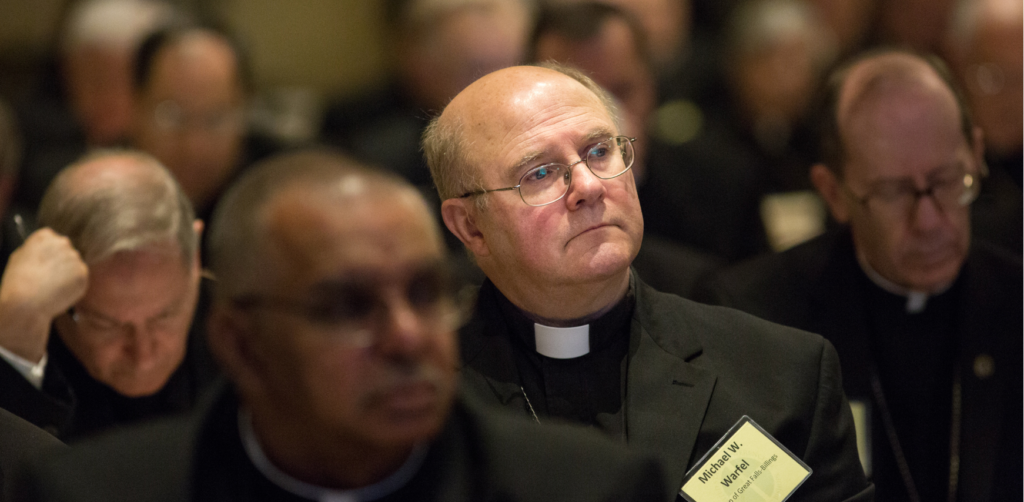
The Fresno Diocesan abuse review board has seven members. At least four are retired, and at least five are grandparents. At least six have been married for an average of 47 years. At least five have been in the same job or profession for an average of 37 years. So it's clear that most of the board members are elderly. Let's go a bit deeper. They are an uber-Catholic group of people. Between them, the board members had or have 19 roles, titles, or positions in Catholic institutions. Look at the phrases that they use to describe themselves:
- "A cradle Catholic. . ."
- "A lifelong Catholic. . ."
- "Has had an entirely Catholic education. . ."
- "Taught in Catholic schools for -X- years"
- "Ministers communion to the homebound"
Why do these numbers and phrases matter?
Because this board hears about reports of abuse filed against priests, they evaluate those reports. They recommend whether to suspend an alleged predator or not and whether to oust him from ministry permanently. These individuals are on a panel called a 'review board,' and the bishop has hand-picked each one. According to church rules, each review board member must be a practicing Catholic 'in good standing' in their diocese. So this raises several questions:
-
- Do you think this body - given its composition - is the best group to make those determinations?
- If you had to guess, do you think most people who were sexually violated by a priest would trust this group?
- Would more objective people - for example, non-Catholics - consider this board qualified to perform this crucial and complex task?
- Does it seem likely that these people - all of them devout Catholics - can be objective about abuse charges against their spiritual guides, men who they believe can help them secure eternal life?
- Are men and women who are primarily in their 60s or beyond likely to be the most up-to-date on new developments, research, understanding, and tools about child sexual abuse?
Now, let's be fair. At least, at first glance, these seem like good people. No one denies that teaching is a public service and providing communion is an act of kindness. Sticking with a partner or profession for decades isn't bad. And these men and women deserve some benefit of the doubt. We're not saying they're mean to victims, always believe priests, or are deliberately looking to win the bishop's approval by doing whatever he wants. But again, does it seem likely that a small group of elderly and deeply committed Catholics - each hand-picked by their bishop - can truly be unbiased when evaluating allegations of often heinous sexual abuse against priests who may have baptized their kids, performed their marriage ceremonies, visited them when they were sick in the hospital or consoled their relatives after the death of a spouse? These men and women comprise the Fresno Diocese's clergy abuse review board.
Fresno Bishop John Brennan deserves credit for three choices. He apparently has no clerics on his board, but he has one survivor on his panel. Unlike many bishops, he discloses some information about the individual members. But would any reasonable person read the biographies of Brennan's review board and say, "Wow! These folks are eminently qualified for this role!" Suppose other bishops revealed biographical data about the hand-picked members of their review boards. In that case, we strongly suspect we'd see the same pattern: mostly older people who've spent all or most of their lives as faithful church-goers and devout believers who've tended to obey authorities, not ruffle too many feathers and not developed reputations as courageous whistleblowers or unwavering advocates for the oppressed.
Can't bishops do better? Why do so few of them reveal the names and backgrounds of their review boards? Why can't they choose a more diverse group of individuals with broader age ranges, more varied life experiences, and a history of being willing to question authority? The logical conclusion: Bishops don't want boards like that. They want boards that will listen quietly, doubt little, say less, and mostly defer to clerics they've long respected and trusted. This is yet another reason the Catholic church's decades-long clergy sexual abuse and cover-up crisis continues to fester with no end in sight.
Horowitz Law is a law firm representing victims and survivors of sexual abuse by religious authority figures and numerous sexual assault lawsuits against massage therapists. If you need a lawyer because a member of a religious organization, doctor, professional, or therapist sexually abused you, contact us today at 888-283-9922 or [email protected] to discuss your options today.